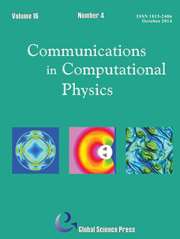Crossref Citations
This article has been cited by the following publications. This list is generated based on data provided by
Crossref.
Holm, Darryl D.
and
Tyranowski, Tomasz M.
2018.
Stochastic discrete Hamiltonian variational integrators.
BIT Numerical Mathematics,
Vol. 58,
Issue. 4,
p.
1009.
Hong, Jialin
Huang, Chuying
and
Wang, Xu
2018.
Symplectic Runge–Kutta methods for Hamiltonian systems driven by Gaussian rough paths.
Applied Numerical Mathematics,
Vol. 129,
Issue. ,
p.
120.
Anmarkrud, Sverre
Debrabant, Kristian
and
Kværnø, Anne
2018.
General order conditions for stochastic partitioned Runge–Kutta methods.
BIT Numerical Mathematics,
Vol. 58,
Issue. 2,
p.
257.
Han, Minggang
Ma, Qiang
and
Ding, Xiaohua
2019.
High-order stochastic symplectic partitioned Runge-Kutta methods for stochastic Hamiltonian systems with additive noise.
Applied Mathematics and Computation,
Vol. 346,
Issue. ,
p.
575.
Cohen, David
Debrabant, Kristian
and
Rößler, Andreas
2020.
High order numerical integrators for single integrand Stratonovich SDEs.
Applied Numerical Mathematics,
Vol. 158,
Issue. ,
p.
264.
Zhang, Xin
Fu, Yichen
and
Qin, Hong
2020.
Simulating pitch angle scattering using an explicitly solvable energy-conserving algorithm.
Physical Review E,
Vol. 102,
Issue. 3,
Kraus, Michael
and
Tyranowski, Tomasz M
2021.
Variational integrators for stochastic dissipative Hamiltonian systems.
IMA Journal of Numerical Analysis,
Vol. 41,
Issue. 2,
p.
1318.
Li, Xiuyan
Ma, Qiang
and
Ding, Xiaohua
2021.
A NOVEL WAY CONSTRUCTING SYMPLECTIC STOCHASTIC PARTITIONED RUNGE-KUTTA METHODS FOR STOCHASTIC HAMILTONIAN SYSTEMS.
Journal of Applied Analysis & Computation,
Vol. 11,
Issue. 4,
p.
2070.
Wang, Junjie
2021.
Symplectic‐preserving Fourier spectral scheme for space fractionalKlein–Gordon–Schrödingerequations.
Numerical Methods for Partial Differential Equations,
Vol. 37,
Issue. 2,
p.
1030.
Yin, Xiuling
Gao, Xiulian
Liu, Yanqin
Shen, Yanfeng
and
Wang, Jinchan
2021.
Symplectic-Structure-Preserving Uncertain Differential Equations.
Symmetry,
Vol. 13,
Issue. 8,
p.
1424.
Fu, Yichen
Zhang, Xin
and
Qin, Hong
2022.
An explicitly solvable energy-conserving algorithm for pitch-angle scattering in magnetized plasmas.
Journal of Computational Physics,
Vol. 449,
Issue. ,
p.
110767.
Hong, Jialin
and
Sun, Liying
2022.
Symplectic Integration of Stochastic Hamiltonian Systems.
Vol. 2314,
Issue. ,
p.
53.
Bréhier, Charles-Edouard
Cohen, David
and
Jahnke, Tobias
2023.
Splitting integrators for stochastic Lie–Poisson systems.
Mathematics of Computation,
Vol. 92,
Issue. 343,
p.
2167.
Anton, Cristina
2023.
Explicit pseudo-symplectic Runge-Kutta methods for stochastic Hamiltonian systems.
Applied Numerical Mathematics,
Vol. 185,
Issue. ,
p.
18.
Anton, Cristina
2025.
A new class of symplectic methods for stochastic Hamiltonian systems.
Applied Numerical Mathematics,
Vol. 208,
Issue. ,
p.
43.
Gu, Shuaizhen
Chen, Ju
and
Tian, Qiang
2025.
An adaptive time-step energy-preserving variational integrator for flexible multibody system dynamics.
Applied Mathematical Modelling,
Vol. 138,
Issue. ,
p.
115759.
Wang, Junjie
2025.
Some energy-preserving schemes for fractional Hamiltonian system with fractional Laplacian.
Mathematics and Computers in Simulation,
Vol. 231,
Issue. ,
p.
185.


